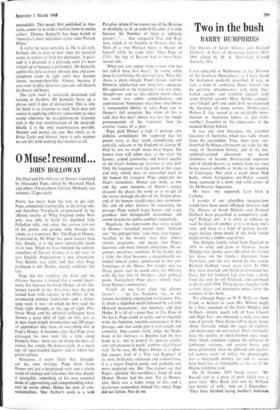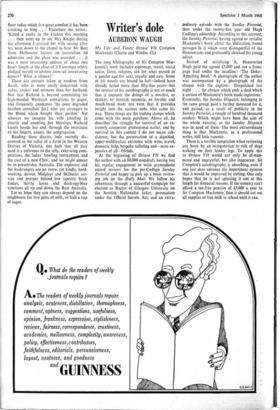Two in the bush
BARRY HUMPHRIES
I was educated in Melbourne at the 'Harrow of the Southern Hemisphere,' as I have heard the institution modestly described. It was, in fact, a kind of ambitious Dame School run by geriatric schoolmasters with mild Aus- tralian accents and youthful emigrs with acute English accents. Here, besides compul- sory Chapel, golf and cadet drill, we examined the literature of many nations. Drinkwater's Robert E. Lee served as an invaluable intro- duction to American letters, as did Gals- worthy's Loyalties to the endeavours of the modern British School.
It was our own literature, the youthful literature of Australia, which was sadly absent from the curriculum. True, there were sun- drenched fly-blown afternoons set aside for the study of Australian history, and in the hot, sandwich-scented classroom we heard chronicles of byssine thirst-crazed explorers and of inland deserts; as remote from our own bosky coastal suburbs as Araby or the country of Cockaigne. Not even a word about Ned Kelly, whose ferruginous pre-Nolan armour hung neglected in a dank and solid corner of the Melbourne Aquarium.
He must, one supposed, have been a Catholic.
I wonder if our schoolboy imaginations would have been mnch inflamed, however, had The Diaries of Sarah Midgley and Richard Skilbeck been prescribed as compulsory read- ing? Perhaps not: it is often as arduous to read the diary of another as it is to keep one's own; and there is a kind of prosaic parish- paper feeling about much of this book which might not be a kiddie's cup of tea.
The Midgley family sailed from England in 1851 to settle and farm in Victoria. Sarah Midgley was twenty years old when she started her diary on the family's departure from Yorkshire, and she was joined by her cousin Richard Skilbeck seven years later. In 1861 they were married and Sarah discontinued her diary, but her husband had also kept a diary from the time he left England, and continued to do so until 1864. These diaries, together with various letters and .descriptive notes, form the contents of this book.
Yet although Pepys or N. P. Willis or Anne Frank or Kilvert or even Mrs Wilson might be a finer exponent of the form, Midgley and Skilbeck—despite much talk of Low Church and High Tea—are obviously a very, very nice type of person. Their diaries tell us many things about Australia which the sagas of explorer and bushranger do not reveal. Their chronicles have the quality of old-fashioned sepia snap- shots which somehow capture the minutiae of landscape, costume and gesture better and more poignantly than the debased and equivo- cal camera tricks of today; for photography was a nineteenth century art and its secrets have been lost as irrevocably as the art of the filigree valentine card.
On 26 October 1855 Sarah writes: `Mr Russell sent us a piece of pork which was a great treat. Miss Birch also sent by William two bottles of milk.' And on 2 December: `They have finished laying mother's bedroom floor today which is a great comfort it has been creaking so long . . .' Elsewhere she writes : `Killed a snake in the kitchen this morning . . . then went up to see Mrs Knight during the afternoon I assisted her with sewing after tea went down to the chapel to hear Mr Burt from Melbourne lecture on teetotalism 6d admission and the place was crowded . . . it was a most interesting address of about two hours length at the close of it I amongst others pledged myself to abstain from all intoxicating liquors! What a climax!'
These are extracts taken at random from Sarah, who is more cosily concerned with cakes, snakes and sermons than her husband. Not that Richard is beyond committing his high-minded Wesleyan convictions to paper, and frequently condemns 'the poor degraded heathen cannabals [sic] who are strangers to the Blood which bought their pardon.' Yet whereas we imagine his wife kneeling in church and counting her blessings, Richard kneels beside her and, through the interstices of his fingers, counts the congregation.
Reading these diaries, only recently dis- covered in the cellar of a farm in the Western District of Victoria, one feels that all they need is a reference to the telly, cake-icing com- petitions, the ladies' bowling tournament, and the cost of a new Chev., and we might almost be in present-day Australia. The explorers and the bushrangers are no more; yet kindly, hard- working, devout Midgleys and Skilbecks sur- vive and prosper behind low tapestry brick fences, thirsty lawns and duck-egg-blue venetian all up and down the Real Australia.
Let us hope they can always depend on the neighbours for two pints of milk, or half a cup of sugar.



































 Previous page
Previous page